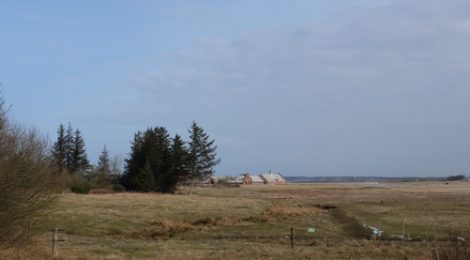
Re-scaling the Rural Thy/Aarhus 2022-May-20-23
Thy/Aarhus 20 – 23 May 2022
Four days of themed paper sessions, keynotes, and walks in the district of Thy, in Northern Denmark.
Data centres, precision-farming, home offices and increasing connectivity: new forms of rurality are emerging physically and conceptually, and new dynamics are at play between ‘human’, ‘extra human’ and ‘non-human’ scales. What possibilities might there be within these new inter-scale relationships? What social and environmental gains and losses are at stake? Re-Scaling the Rural aims to initiate a critical investigation of past, current, and what may become future concepts and interpretations of rural life.
The UN’s 2018 Declaration on the Rights of Peasants and Other People working in Rural Areas (UNDROP) highlighted the power imbalance that exists between the ‘big players’ in global agribusiness on one hand, and smallholding farmers, local fishing communities, migrant rural workers and indigenous peoples, on the other. While the UNDROP may be primarily aimed at developing countries, it may be as relevant to many European countries where, for instance, big farming industries are replacing small-scale farming at a rapid pace and villages are being abandoned, partly as a consequence of politically supported centralization. Does UNDROP belong to a paradigmatic alternative to the ‘urbanization of everything’? What kinds of ruralities might pertain if small rural voices (including those of other species) were listened to more? What can cities learn from villages? (and vice versa)? What if farms and other industrial projects in affluent countries got smaller instead of bigger?
Re-scaling the Rural will be interdisciplinary, international and local in scope. It will take place in, and be informed by, the Thy region of the west coast of Denmark. The conference will include paper presentations, keynote lectures and guided walks and talks in the area.
Download the programme & call for papers PDF
Themes
The conference is structured around three broad rural themes that will be manifest in the surroundings of our rural conference venue in Thy: Coast, Farmland, and Nature. Each of these is allocated a day in the conference schedule that will include paper presentations, key notes, as well as guided walks and talks to sites of particular thematic relevance. Each day will culminate with communal dining.
The coastal municipality of Thy includes extensive natural and cultivated landscapes and is the setting for several village communities. The area has historically provided great natural benefits for farming, fishing, tourism and other rural industries but now has to address the major environmental, economic and ethical challenges facing these industries. Urbanization and depopulation, landscape decay and green energy conversion are also among the major issues that Thy faces, in common with other rural territories.
Following three days in Thy, the fourth and final day of the conference will be devoted to concluding discussions, and an exhibition with poster sessions in the Aarhus School of Architecture, Aarhus.
Key-dates:
Submission of abstracts: 25 January 2022 extended until February 1st!
Notification of acceptance: 10 March 2022
Deadline for registration: 15 April 2022
Conference: 20-23 May 2022
Post-conference publication: Tba
Website: https://aarch.dk/en/re-scaling-the-rural/
Contact: If you have any queries please email the organisers at:
re-scaling-the-rural@aarch.dk
Day 1 (May 20) – Coast
Thy’s coastal village communities were traditionally oriented to the fishing and shipping trades. Today, tourism plays an increasing role in local coastal economies and the fishing industry has transformed into industrialized fishing fleets. In this region however, inland farming villages have been less successful in attracting tourism than those by the sea and consequently social imbalances between farming and coastal communities is a concern here. What are the spatial implications of the growth of tourism in these local coastal environments and cultures? And what futures can be envisioned for the rural communities, places, and practices neighboring the sea?
Topics in this session may include but are not limited to:
- Communities, places, and practices
- Seaboard villages in transition
- New forms of tourism
- Cultural heritage challenges
Walk and talk 1: Seaboard villages in transition. Sites to be visited will include the industrial fishing harbour at Hanstholm, the ‘Cold Hawaii’ surfing beach at Klitmøller and the beachside fishing villages of Nørre Vorupør and Stenbjerg.
Day 2 (May 21) – Farmland
Transitions in farming practices from smallholdings towards industrial farming (and sometimes vice versa) are changing rural landscapes and communities. The fragile equilibrium of material and immaterial networks that connect and sustain villages have proven vulnerable to demographic shifts such as migration to cities and decreased employment in farming. To what extent do transitions in scales of farming define contemporary rurality and what are the implications for rural sustainability, biodiversity, community cohesion, and rural livelihoods? What counter-movements are emerging in farming practice? How can new rural identities be formed based on reimagined food production techniques and how might these benefit rural space and society? And what futures can be envisioned for those farming villages, places, and practices being left behind by those people moving to bigger towns and cities?
Topics may include but are not limited to:
- Mega farms and smallholdings and their environmental imprints
- Demographic shifts and new rural economies
- The post-pandemic countryside
- New roles for old villages
- Rural identities, social practices and settlement forms
Walk and talk 2: Shifting farmscapes and villages. Sites to be visited will include an abandoned mink farm, an industrial pig farm (from outside), a small farm and a decaying village.
Day 3 (May 22) – Nature
Tropes that conjoin nature and the rural in a tranquil environment beyond urbanity seem nostalgic nowadays, given the state of flux of the contemporary countryside and the difficulty of distinguishing rural processes from urban and global patterns of consumption. With this, and contemporary trends in rewilding and emerging national nature reserves in mind, should we ask if concepts of nature should now include, for instance, windmill farms and solar parks and other sustainable energy sources that ‘nature’ may be dependent upon? Do we require more holistic paradigms to understand emergent human-nature and urban-rural relationships? And might such paradigms necessitate a rethinking of the spatial and material characteristics of land management, nature conservation and our engagement with nature?
Topics may include but are not limited to:
- Planning for climate change resilience and biodiversity
- Rural landscapes, rewilding, and natural reserves
- Architectures of sustainable energy
- Managing human impact on nature and extra human nature
Walk and talk 3: Wilderness and windmills. Places to be visited will include the first Danish national park (National Park Thy) the bird sanctuary at Vejlerne, Limfjord and a windmill test center.
Day 4 (May 23) – Concluding discussions, exhibition + poster presentation (in Aarhus)
The final day of the conference will take place in The Aarhus School of Architecture in Aarhus. It will include concluding discussions and talks and an exhibition with poster presentation talks.
– – – – – – – – – – – – – – – – – – – – – – – – – – – – – – – – – – – – – – – – – – – – – – – –
When: May 20-23 2022
Place: Re-scaling the Rural is to take place in Thy (rural) as well as in Aarhus (urban), it will be co-hosted by Thisted Municipality at the west coast of Denmark and Aarhus School of Architecture in Aarhus.
Organizers: The event is organized by Aarhus School of Architecture in collaboration with Thisted Municipality, ARENA, and Rural Agentur, Denmark.
Who is it for: The conference alternates between theory and practice and aims at establishing a platform for interdisciplinary exchange of knowledge between researchers, practitioners, planners within architecture, but also welcomes contributions from artists, agronomists, farmers, anthropologists, archaeologists, geographers, and all other related fields.
Conference costs:
Full conference: €290
Independent researchers, artists, and PhD students:
Full conference: €150
Optional transport between Aarhus and Thy will be arranged at an additional fee. Communal dinner is included in the fee.
Abstract: Please send a 300-word (maximum) abstract and, on a separate sheet a 100-word (maximum) biography to:
Abstracts that respond to the themes outlined in this programme and represent not previously presented research are prioritized.

